Solidarity in Emergency Response – The case of the 2015 Tamil Nadu Floods
 Author: Esther Mariaselvam
Author: Esther Mariaselvam
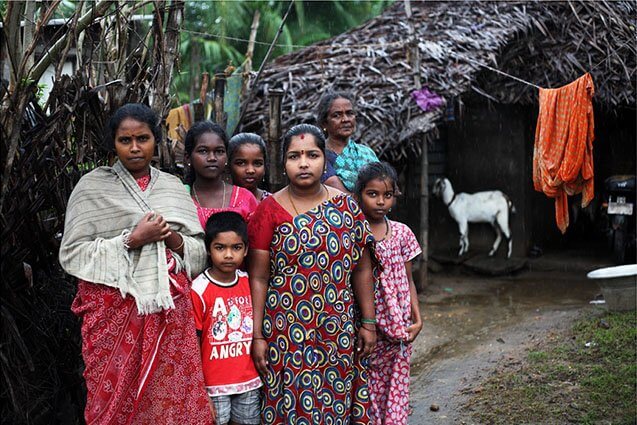
Like most people of India the residents of Chennai and Tamil Nadu love the rain. After the scorching heat that in Tamil Nadu continues through the year, a little rain can soothe hearts and minds. But the bouts of heavy rain that occurred last November and December brought with them devastation for the residents of Chennai and also for people in other parts of Tamil Nadu. The heavy downpour, considered the worst experienced in the past 100 years, led to unprecedented floods that completely battered the capital city and its suburbs. The deluge has killed over 450 people, while hundreds of houses on the riverbanks were damaged or washed away, forcing thousands of families to live on the streets for over a month.
Amidst the chaos, fear and insecurity, solidarity and help also started pouring in soon after the rains stopped. It was amazing to see people from all walks of life physically and emotionally engaged in the emergency response efforts that followed. These efforts saved many lives and also gave hope to all.
People’s solidarity in times of crisis
“It was very overwhelming to see how many volunteers would regularly come and deliver food and other supportive materials. Solidarity among people is what made us survive for 15 days in the open,” was what Manjula said, she lives in the P P Garden area near the Coovum river which has badly affected by floods.
“I have very poor vision and during nights I cannot see anything. Moreover, I was so weak that I could not even move an inch when the floodwater gushed into my house. It was only when the street kids came rushing to my place and took me to the nearby library building. Else, I would have been killed that day only,” says octogenarian Punniyamma recalling her traumatic experiences. Punniyama is a single woman lives at Rangoon Street along the Coovum River bank. In her area more than 300 shanty houses have been washed away, while over 500 others were damaged by the floods. Punniyama still showed signs of her nervous anxiety while narrating the days of trauma she went through during the floods. She survived because her neighbours shared their food and children brought her water.
Manjula and Punniyamma were among the several hundred women who received timely help from the emergency response efforts that ActionAid India (AAI) began and its allied organisations began in flood affected areas in Chennai and other regions.
Reaching out to the most vulnerable
ActionAid’s approach to Emergency Response includes the targeting of the most marginalised communities and focusing on vulnerable groups such as women, children and elderly. In Chennai also AAI focused emergency response to reach out to the most marginalised and vulnerable groups including single women, elderly, children, trans women and women infected with HIV and AIDS. The communities that we tried to reach out included the Dalits, Irula tribals, saltpan workers, fisher folk communities and the urban poor such as the homeless and workers in the informal sector.
We were able to respond quickly to the emergency providing immediate relief such as dry rations, drinking water, blankets, solar lamps and medical supplies. The AAI team in Chennai was able to maintain 24X7 support for several weeks, and very soon colleagues from other parts of the country joined the efforts. The AAI team with allied organisation strived together to reach out to those who were in dire need of relief assistance. Within few days, we managed to cover the most affected areas.
Support started coming in from outside. Numerous Individual donors and a number of corporate houses provided much needed support, and we accelerated our relief distribution efforts in no time. By the end of December 2015, we had reached out to over 10,000 families across the flood-affected regions. Apart from dry rations, water and medicines, we also provided utensils, clothes, solar lamps, school bags and books in a bid to bring the lives of flood affected back closer to normalcy.
It was also overwhelming to see the support of volunteers. Hundreds of employees from various corporate houses including volunteers from Jet Airways, Seimens and the Tata Group, joined us during our initial phase of response efforts. The team of volunteers helped us in assessing the needs of the affected families, they played a crucial part in the distribution of relief materials in several areas and they also extended their physical labour to clean mud filled houses and roads.
Dealing with the aftermath
Yes, after putting all the energy in emergency response for 2 weeks it was time to take stock and deal with the loss. In emergencies, it is people living in poverty and exclusion, particularly women, who are worst affected. We see disasters as part of the cycle of poverty, and we seek to use every opportunity, even the context of disaster, to see how we can shift power relationships in favour of the poorest and most excluded – especially women.
A quick needs assessment helped to identify the extent of damages caused. This ranged from loss of belongings and shelter, to loss of lives. Priority was given to disabled women, single women (including deserted women) and women living with disabled children.
During community consultations, people expressed the need for repairing and reconstructing shelters damaged or lost during the floods. We could see that most of the people who lost their shelters were living in miserable and unhygienic conditions. Women working as domestic workers had also lost their livelihoods, as they could not go for work. Those who were doing small business out of home also lost everything. It was despair all over and it posed a challenge for us too.
Rehabilitation: Tackling housing
After much deliberation, we decided to build or repair of shelters for hundreds families whose houses have either been washed away or damaged by the floods. Securing donor support in the task of restoration of shelter was a challenge as there was initial hesitation to support housing when there was existent threat of eviction. However some donors came forward to support us in our endeavour to provide temporary shelters to those who are most in need. As on June 2016 we have been able to provide support for the repair of 679 shelters and have repaired or reconstructed 453 shelters.
“Nothing was left at my house. The floodwater swept away everything that I had except, and left behind dirt and potholes. I am happy that you people helped me repair my house,” says Eshwari, a 65-year-old widow in Rangoon Street.
Rehabilitation: Skill training
Apart from shelter repairing and reconstruction, we have also initiated skills training programmes and distribution of aid items to 3589 women to revitalise business and in case of women with disability to facilitate their mobility and access. As part of our rehabilitation support, we also helped dozens of transgender to resurrect their lost livelihood options. A total of 49 trans-women have so far been trained in embroidery, liquid embroidery, mural art, paper products making (bags, folders, note pads, card board files with recycling materials), textile printing as such batik print, block print, tie & dye with naphtha colour techniques. 300 women with disability have already benefited with the provision of items such as hearing aid, crutches, reading materials in braille, wheel chairs, tricycles. They have also gained skills in embroidery, mural art painting, tailoring, paper products, etc
In the process of providing rehabilitation we enabled women to create a space for themselves to empower themselves by participating in community committees that were set up in every project and made in charge of project implementation, beneficiary selection and project monitoring. A total of 217 women have been engaged as part of community committees.
Of the 1090 planned livelihood enhancement activities we were as yet able to implement 982. Our efforts will continue and we are hoping to enhance livelihood opportunities by building earning skills of many more women in the coming days.
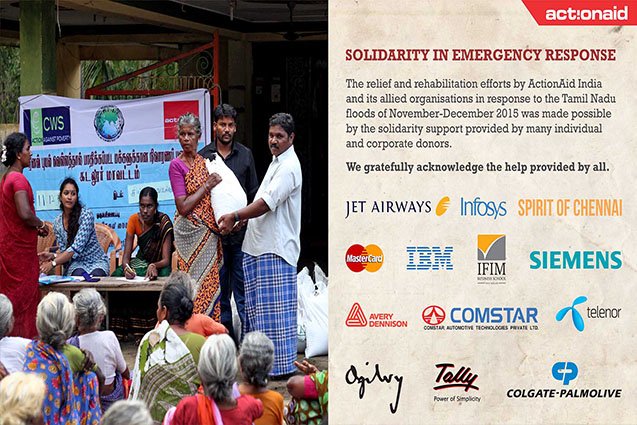
“C. Sangeetha, is a 38-year old married woman from Cuddalore District. Her husband is a drunkard and sickly man. He does not go for work regularly and therefore cannot support the family. Sangeetha has two girl children who are studying in a government school. The only source of income for the family was her cart from where she sold fruits and flowers. In the flood her goods were ruined and the cart was spoilt. To restart her business and reduce her burden of debt, 5000 rupees worth of material were given to her to sell.”
“Summathi is divorcee and lives with her two sons. She makes her living through a small grocery shop that serves the community. She is part of the self help group (SHG) and that has given her an opportunity to know community members very well and have good relations with them. “Participation in the committee gives me the chance to ensure that the most in need are helped, especially single mothers.”
“Shanthi lives with her two sons and one daughter. She is a housewife and participates in the SHG. “We women take better decisions and we are more sensitive to community needs.”
Conclusion
The ActionAid team and the allied organisations have been heartened by the solidarity displayed amongst the community. We were greatly enthused by the support provided by hundreds of individual donors and the many corporate donors. Although women all over the globe receive only less than 5% of the global funding for humanitarian assistance and aid, it was this spirit of solidarity that enabled ActionAid india and its 21 partners to address flood needs in Chennai and Tamil Nadu. Dealing with the floods has taught us many a valuable lesson in organizing emergency response and also providing rehabilitation support. I believe we will bring these learnings into practice and work continuously to bring in change and hope among the communities we work with.
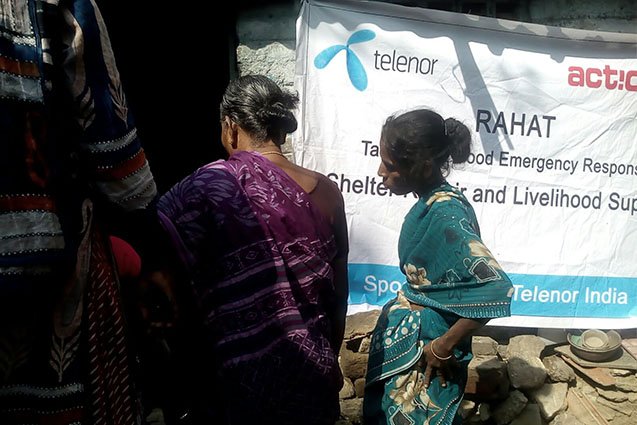
Houses being repaired on Appasamy Street, Chennai
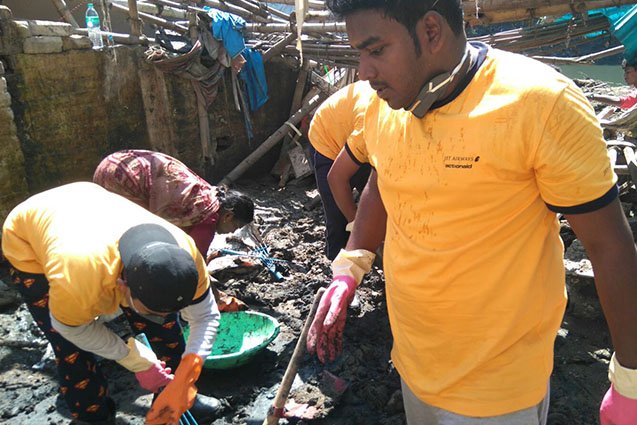
Volunteers from Jet Airways helping clean houses on Appasamy Street, Chennai
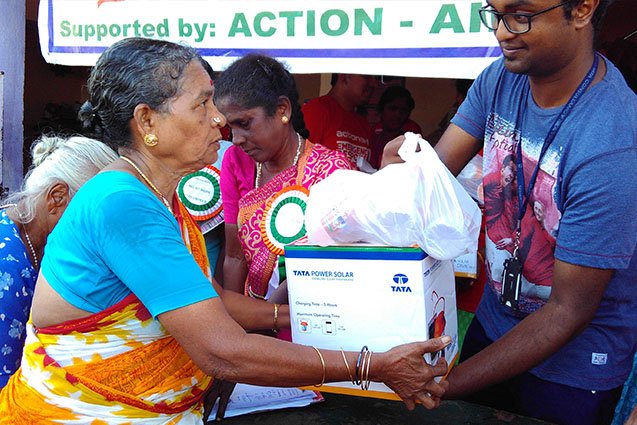
Relief material being distributed to flood affected
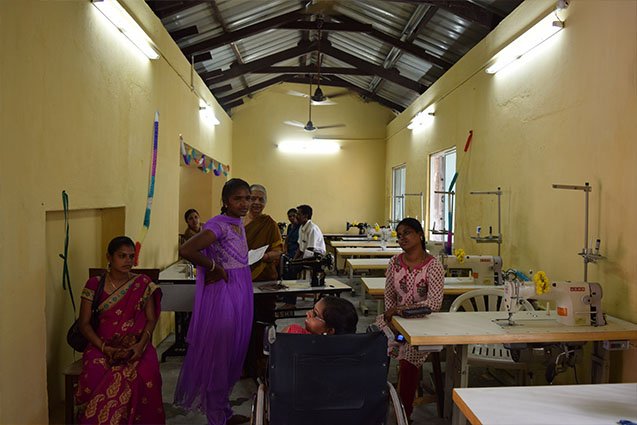
Training center for enhancing livelihoods of flood affected women, set up with Society For Rights of All Women with Disabilities



